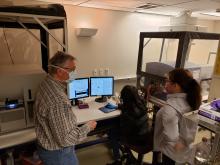When the COVID-19 pandemic started, researchers at the Case Comprehensive Cancer Center immediately created plans to shift activities towards combating this deadly disease. Here are three examples of the impact on member research.
Identifying potential therapeutic agents against SARS-CoV-2
Over the past 10 years, the Berdis laboratory, led by Anthony Berdis, PhD, has developed several new chemical agents that function as anti-cancer agents against acute lymphoblastic leukemia (ALL) and glioblastoma multiforme (GBM). The primary focus of this work is the development and pre-clinical testing of artificial deoxyribonucleotides that target DNA polymerase activity which is responsible for the hyperproliferative nature of these cancers. Viruses such as SARS-CoV-2, the causative agent of the COVID-19 pandemic, are also classified as hyperproliferative organisms as they replicate uncontrollably. To combat SARS-CoV-2, the Berdis lab has begun efforts to develop unique ribonucleoside analogs designed to efficiently and selectively inhibit viral replication catalyzed by the viral RNA-dependent RNA polymerase. To date, the lab has cloned the viral RNA-dependent RNA polymerase gene, introduced the cloned gene into an E. coli overexpression system, and purified the enzyme to ~95% homogeneity. They are currently assessing the ability of our analogs to function as chain-terminating substrates for the polymerase. This represents an important first step in the drug discovery process to develop therapeutic agents against SARS-CoV-2 and other potential coronaviruses that can infect humans and other mammals.
Developing innovative strategies for treatment of SARS-CoV-2 infection
Zheng-Rong Lu, PhD leads a lab that is primarily dedicated to cancer research, focused on the translational development of 1) peptide-conjugated imaging probes specifically targeted to molecular markers of the tumor microenvironment for MRI- and PET-based detection and risk-stratification of neoplasms and 2) nanoparticle-mediated delivery of macromolecular therapeutics like siRNA, miRNA, lncRNA, CRISPR/Cas, and plasmid DNA for treatment of cancers and ocular diseases. With the beginning of the devastating COVID-19 pandemic, the lab began employing its technical and intellectual resources towards designing and developing innovative strategies for treatment of SARS-CoV-2 infection. Partnering with collaborators, the lab is customizing a versatile nanoparticle platform to deliver siRNAs and miRNAs to target the SARS-CoV-2 genome, and are evaluating its feasibility of inhibiting viral replication with RNAi therapy. Some promising results have been obtained to inhibiting viral replication. Using their expertise in peptide research, the lab has identified and generated novel peptides with high binding affinity to coronaviral epitopes to develop synthetic antibodies for potentially blocking and neutralizing the coronaviral particles. In this way, in addition to the lab's regular research, they are also endeavoring to address the challenges of the current pandemic and those of any future viral outbreaks.
Flow Cytometry facility maintains functionality to support critical research
As the COVID19 shut down approached Case Western Reserve University (CWRU), the team of cytometrists in the Cancer Center Flow Cytometry and Imaging Microscopy Shared Resource worked to make a plan to maintain functionality of the Core while keeping machines open for critical research. Through the use of masks, limitation of user overlap, religious cleaning regimes, and expansion of device usage over seven days a week coupled with expanded usage hours, CWRU was one of a handful of comprehensive cancer center cytometry cores in the US to remain fully operational through the shutdown. This was only made possible as a result of the dedication of the Core Staff: Mike Sramkoski (Manager), D'Arbra Blankenship (Assistant Manager) and Kyla Johnson who worked on alternating schedules to meet the needs of the research community. As a result of their dedication to the mission of the Cancer Center and recognition of the great need for these technologies, our researchers are better positioned for the upcoming grant deadlines than those who had no or very limited access to research facilities.
Social Media
We encourage you to share your stories about life as a cancer researcher during this time. On Twitter tag @caseccc and use #COVID19 or #COVID19nCancer. You may also email the Cancer Center communications team at cancer@case.edu.
Case CCC COVID-19 Resource Hub
As the COVID-19 outbreak progresses, the Case Comprehensive Cancer Center (Case CCC) has centralized COVID-19 related news and resources for our cancer center community. Content is updated regularly.
Visit the COVID-19 Resource Hub




